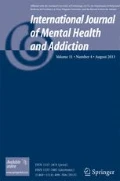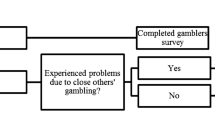Abstract
Gambling is now big business in Australia and public expenditure on gambling is high. Some individuals gamble to excess with adverse consequences for themselves and their partner. The present study targeted women who had concerns about a current or previous partner’s gambling and employed a qualitative methodology to explore their experiences, understandings and responses. Various recruitment strategies were used to avoid an excessive reliance on a clinical sample and to attract participants in different walks of life. The final sample comprised twenty-three women, eleven of whom continued to maintain a marital or de facto relationship with the gambler. Data were gathered by means of in-depth interviews and subjected to thematic analysis. Findings from the study indicate that women are likely to be the victims and enablers of their partner’s gambling and may also provide informal help and care. Implications for community education programs, formal services and Australian law are discussed.
Similar content being viewed by others
References
Abbott, D. A., Cramer, S. L., & Sherrets, S. D. (1995). Pathological gambling and the family-practice implications. Families in Society, 76(4), 213–219.
Abbott, M. W., & Volberg, R. A. (1999). Gambling and problem gambling in the community: an international overview and critique. Report Number 1 of the New Zealand Gaming Survey. Accessed 23 Oct 2006: http://www.stv.govt.nz/Pubforms.nsf/URL/report1.pdf.
American Gambling National Impact Study Commission Final Report (1999). Accessed 4 March 2008: http://books.google.com.au/books?id=-p7ZF9KW8-MC&pg=PA48&dq=a.. Australian Yearbook 2008. Accessed 5 March 2008: www.abs.gov.au/AUSSTATS/abs@.nsf/Latestproducts/1301.0.
Benner, P. E. (1984). Stress and satisfaction on the job. New York: Praeger.
Brading, R. Collateral damage: How the legal system has failed families of problem gamblers. Wesley Community Legal Service, 15 Belvoir St., Surry Hills, NSW, 2010.
Braun, V., & Clarke, V. (2006). Using thematic analysis in psychology. Qual Res Psychol, 3, 77–101. doi:10.1191/1478088706qp063oa.
Coyne, J. C., Ellard, J. H., & Smith, D. A. (1990). Social support, interdependence, and the dilemmas of helping. In B. R. Sarason, I. G. Sarason, & G. R. Pierce (Eds.), Social support: An interactional view (pp. 129–149). New York: Wiley.
Craig, L. (2006). Does father care mean fathers share. Gender and Society, 20(2), 259–281. doi:10.1177/0891243205285212.
Darbyshire, P., Oster, C., & Carrig, H. (2001). The experience of pervasive loss: children and young people living in a family where parental gambling is a problem. Journal of Gambling Studies, 17(1), 23–45. doi:10.1023/A:1014536315167.
Dickson-Swift, V. A., James, E. L., & Kippen, S. (2005). The experiences of living with a problem gambler: Spouses and partners speak out, Journal of Gambling Issues, 13. Accessed 5 May 2007: http://www.camh.net/egambling/issue13/jgi_13_dicksonSwift.html.
Grant Kalischuk, R., & Cardwell, K. (2004). Problem gambling and its impact on families. Final Report submitted to the Albert Alcohol and Drug Abuse Commission (AADAC). Edmonton, AB. Accessed 7 Sept 2006: http://scholar.google.com/scholar?hl=en&lr=&q=cache:P4SVdvWYr8QJ: corp.aadac.
Grant Kalischuk, R., Nowatzki, N., Cardwell, K., Klein, K., & Solowoniuk, J. (2006). Problem gambling and its impact on families: a literature review. International Gambling Studies, 6(1), 31–60. doi:10.1080/14459790600644176.
Heineman, M. (1987). A comparison: the treatment of wives of alcoholics with the treatment of wives of pathological gamblers. Journal of Gambling Behaviour, 3(1), 27–40.
Hodgins, D. C., & el-Guebaly, N. (2000). Natural and treatment-assisted recovery from gambling problems: a comparison and resolved and active gamblers. Addiction, 95, 777–789. doi:10.1046/j.1360-0443.2000.95577713.x.
Krishnan, M., & Orford, J. (2002). Gambling and the family: from the stress-coping-support perspective. International Gambling Studies, 2, 61–83. doi:10.1080/14459790208732300.
Lamke, P. A. (1997). A conceptual approach to understanding abused women’s stay/leave decisions. Journal of Family Issues, 18(3), 290–314. doi:10.1177/019251397018003004.
Lesieur, H. R. (1996). Costs and treatment of pathological gambling. Annals of the American Academy of Political and Social Science, 556, 153–171. doi:10.1177/0002716298556001012.
Liang, B., Goodman, L., Tummala-Narra, P., & Weintraub, S. (2005). A theoretical framework for understanding help-seeking processes among survivors of intimate partner violence. American Journal of Community Psychology, 36(1/2), 71–84. doi:10.1007/s10464-005-6233-6.
Lorenz, V. C. (1987). Family dynamics of pathological gamblers. In T. Galski (Ed.), The handbook of pathological gambling (pp. 77–88). Springfield 11: Charles C. Thomas.
Lorenz, V. C., & Shuttlesworth, D. (1983). The impact of pathological gambling on the spouse of the gambler. Journal of Community Psychology, 11, 67–76. doi:10.1002/1520-6629(198301)11:1<67::AID-JCOP2290110107>3.0.CO;2-O.
Lorenz, V. C., & Yaffee, R. A. (1989). Pathological gamblers and their spouses: problems in interaction. Journal of Gambling Behavior, 5(2), 113–126. doi:10.1007/BF01019758.
Marlatt, G. A., & Gordon, J. (1985). In Relapse prevention: Maintenance strategies in the treatment of addictive behaviours. New York: Guilford.
Moos, R. H. (1994). Treated or untreated, an addiction is not an island unto itself. Addiction, 89(5), 507–510. doi:10.1111/j.1360-0443.1994.tb03315.x.
Morgan, L. (2005). Quality part-time work—‘it shouldn’t be so hard!’ Background Paper presented at Families Matter, 9th Australian Institute of Family Studies Conference, Melbourne, 9-11 February. Accessed 13 March 2008: www.aifs.gov.au/institute/afrc9/morgan.rtf.
Morrow, S. (2005). Quality and trustworthiness in qualitative research in counseling psychology. Journal of Counseling Psychology, 52(2), 250–260. doi:10.1037/0022-0167.52.2.250.
Orford, J. (1994). Empowering family and friends: a new approach to the secondary prevention of addiction. Drug and Alcohol Review, 13, 417–429. doi:10.1080/09595239400185551.
Patford, J. (2007). For poorer: how men experience, understand and respond to problematic aspects of a partner’s gambling. Gambl Res, 19(1&2), 7–20.
Polkinghorne, D. E. (2005). Language and meaning: data collection in qualitative research. Journal of Counseling Psychology, 2, 137–145. doi:10.1037/0022-0167.52.2.137.
Ponterotto, J. G. (2005). Qualitative research in counseling psychology: a primer on research paradigms and philosophy of science. Journal of Counseling Psychology, 52(2), 126–136. doi:10.1037/0022-0167.52.2.126.
Productivity Commission (1999). Australia’s gambling industries Report No.10, AusInfo, Canberra.
Rychtarik, R. G., & McGillicuddy, N. B. (2006). Preliminary evaluation of a coping skills training program for those with a pathological gambling partner. Journal of Gambling Studies, 22, 165–178. doi:10.1007/s10899-006-9008-6.
Sarantakos, S. (1994). Social research. Melbourne: MacMillan Education Australia.
Singh, S. (2006). Managing and controlling money in marriage. Accessed 26/2/08: http://madeinatlantis.com/smartshopping/managing_money_marriage_.htm.
Singh, S. & Cabraal, A. (2006). Women, money and the bank. Paper presented to the Financial Literacy, Banking and Identity Conference, RMIT University, Melbourne, 25-26 October 2006.
Sparkes, A. C. (1998). Validity in qualitative inquiry and the problem of criteria: implications for sport psychology. The Sport Psychologist, 12, 363–386.
Velleman, R., Bennett, G., Miller, T., Orford, J., Rigby, K., & Tod, A. (1993). The families of problem drug users: a study of 50 close relatives. Addiction, 88(9), 1281–1289.
Author information
Authors and Affiliations
Corresponding author
Rights and permissions
About this article
Cite this article
Patford, J. For Worse, for Poorer and in Ill Health: How Women Experience, Understand and Respond to a Partner’s Gambling Problems. Int J Ment Health Addiction 7, 177–189 (2009). https://doi.org/10.1007/s11469-008-9173-1
Received:
Accepted:
Published:
Issue Date:
DOI: https://doi.org/10.1007/s11469-008-9173-1



